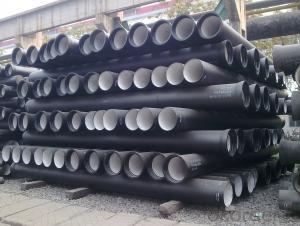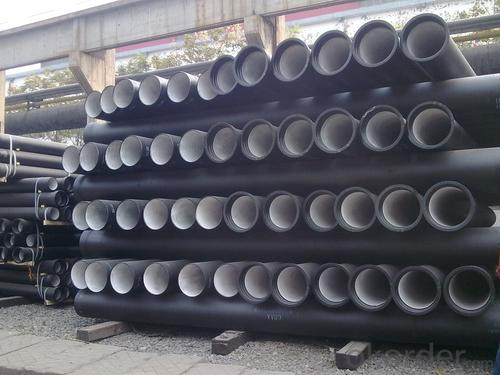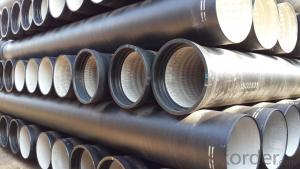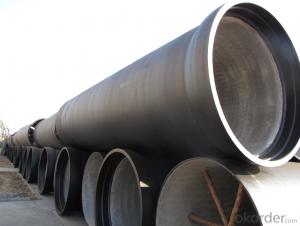Ductile Iron Pipe DN400
OKorder Service Pledge
Quality Product, Order Online Tracking, Timely Delivery
OKorder Financial Service
Credit Rating, Credit Services, Credit Purchasing
You Might Also Like
Specifications
Quick Details
| Place of Origin: | China (Mainland) | Brand Name: | CMAX | Model Number: | T type / K type / Flange type |
| Length: | 6m / 5.7m / Negotiable | Standard: | ISO2531 / EN545 / EN598 | Application: | Potable / Sewage water |
| Diameter: | DN80~DN2200 | Shape: | Round | Hardness: | 230 |
| Pipe Wall Thickness: | standard | Pull Strength: | 420 | Yield (≥ MPa): | 300 |
| Material: | Ductile Iron | Type: | Centrifugal ductile cast iron pipe | Certification: | ISO2531 / EN545 / EN598 |
| Outer Diameter: | 80-2200 | Thickness: | standard | Specification: | DN80~DN2200 |
| |
The advantages to the customer:
Trustworthy financial strength
One-stop shopping.
Fast and efficient service
Coordination of shipments from multiple plants.
Specialists of the overseas shipping process.
A more competitive price.
- Q: Are ductile iron pipes resistant to hydrostatic pressure?
- Yes, ductile iron pipes are resistant to hydrostatic pressure. Ductile iron is a type of cast iron that is known for its strength and durability. It has excellent mechanical properties, including high tensile strength and elasticity, which enable it to withstand high levels of hydrostatic pressure. This makes ductile iron pipes well-suited for applications where water or other fluids need to be transported under pressure, such as in water distribution systems, sewer lines, and industrial pipelines. Additionally, ductile iron pipes have a high resistance to corrosion, which further enhances their ability to withstand hydrostatic pressure and ensures their long-term performance and reliability.
- Q: QT400-10 nodular cast iron requires hardness of HRC47~51. Why can't quench hardness be reached?
- Because of the high tempering stability of the nodular iron, the tempering temperature is 400-450 degrees, and the tempering time is 1 hours.
- Q: What are the requirements for the hydrostatic test of ductile iron pipes?
- Hydraulic test of pipeline segment length should not be more than 1 kilometers, the test pipe should be in full of water, no pressure under the condition of full immersion, soaking time of ductile cast iron pipe without mortar lining not less than 24 hours, a mortar lining the immersion of not less than 48 hours.
- Q: How do ductile iron pipes compare to PVC pipes in terms of strength?
- Ductile iron pipes are generally considered to be stronger than PVC pipes. Ductile iron is a type of cast iron that has been treated with trace amounts of magnesium to give it enhanced strength, flexibility, and ductility. This makes ductile iron pipes highly resistant to cracking and breaking under pressure, making them suitable for a wide range of applications including water and wastewater transportation. On the other hand, PVC pipes are made from a type of plastic called polyvinyl chloride. While PVC pipes are relatively strong and durable, they are not as strong as ductile iron pipes. PVC pipes are more prone to cracking and breaking under high pressure or when exposed to extreme temperature fluctuations. They are often used for low-pressure applications such as irrigation and drainage systems. In terms of strength, ductile iron pipes have a higher tensile strength and can withstand higher internal and external pressures compared to PVC pipes. Ductile iron pipes also have a higher impact resistance, making them less susceptible to damage from external forces such as heavy machinery or accidental impacts. However, it is important to note that the choice between ductile iron and PVC pipes ultimately depends on the specific requirements of the project. Factors such as cost, installation ease, corrosion resistance, and the nature of the fluid being transported should all be considered when deciding between these two materials.
- Q: What are the different types of fittings available for ductile iron pipe?
- There are several types of fittings available for ductile iron pipe, including elbow fittings, tee fittings, cross fittings, reducer fittings, flanged fittings, and mechanical joint fittings. These fittings are designed to connect and redirect the flow of the pipe, ensuring a secure and efficient system.
- Q: How are ductile iron pipes made?
- Ductile iron pipes are made through a process called centrifugal casting. In this method, molten iron is poured into a rapidly spinning mold, which forces the iron to evenly distribute along the walls of the mold. As the mold continues to spin, the iron cools and solidifies, forming a hollow cylindrical shape. This process allows the iron to retain its strength and flexibility, making it suitable for use in various piping applications.
- Q: What is the typical diameter range of ductile iron pipes?
- The typical diameter range of ductile iron pipes is between 4 inches and 64 inches.
- Q: Are ductile iron pipes suitable for installation in areas with high soil settlement and consolidation?
- Yes, ductile iron pipes are suitable for installation in areas with high soil settlement and consolidation. Ductile iron pipes have high strength and flexibility, allowing them to withstand ground movements without cracking or breaking. They are also resistant to corrosion, which further enhances their suitability for such environments.
- Q: Can ductile iron pipe be used for power plant cooling water systems?
- Indeed, power plant cooling water systems may utilize ductile iron pipe. Ductile iron pipe possesses remarkable strength and longevity, rendering it appropriate for diverse applications, including cooling water systems in power plants. Its superb corrosion resistance shields it against the deleterious impacts of water and chemicals frequently present in such systems. Moreover, the smooth interior surface of ductile iron pipe reduces friction loss and enables efficient water flow. These attributes establish ductile iron pipe as a dependable and economical option for power plant cooling water systems.
- Q: Can ductile iron pipes be used in tunneling or microtunneling projects?
- Yes, ductile iron pipes can be used in tunneling or microtunneling projects. Ductile iron pipes are known for their strength, durability, and flexibility, making them suitable for underground applications. They can withstand the external pressure exerted by the surrounding soil or rock during tunneling, ensuring the integrity and safety of the project. Additionally, ductile iron pipes have excellent corrosion resistance properties, which is crucial in tunneling projects where the pipes are exposed to moisture and other corrosive elements. Their smooth internal surface also facilitates the flow of fluids or materials through the pipes, making them an ideal choice for tunneling or microtunneling projects.
Send your message to us
Ductile Iron Pipe DN400
OKorder Service Pledge
Quality Product, Order Online Tracking, Timely Delivery
OKorder Financial Service
Credit Rating, Credit Services, Credit Purchasing
Similar products
Hot products
Hot Searches
Related keywords

























